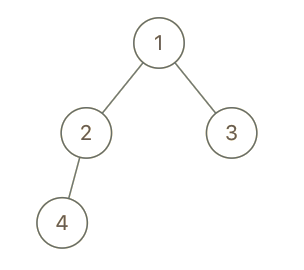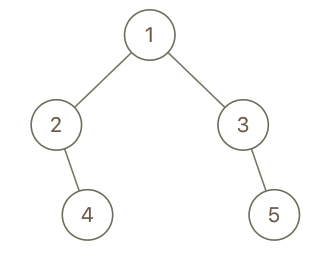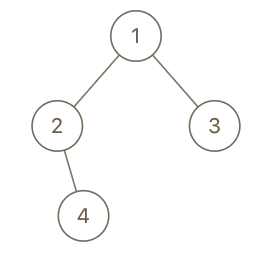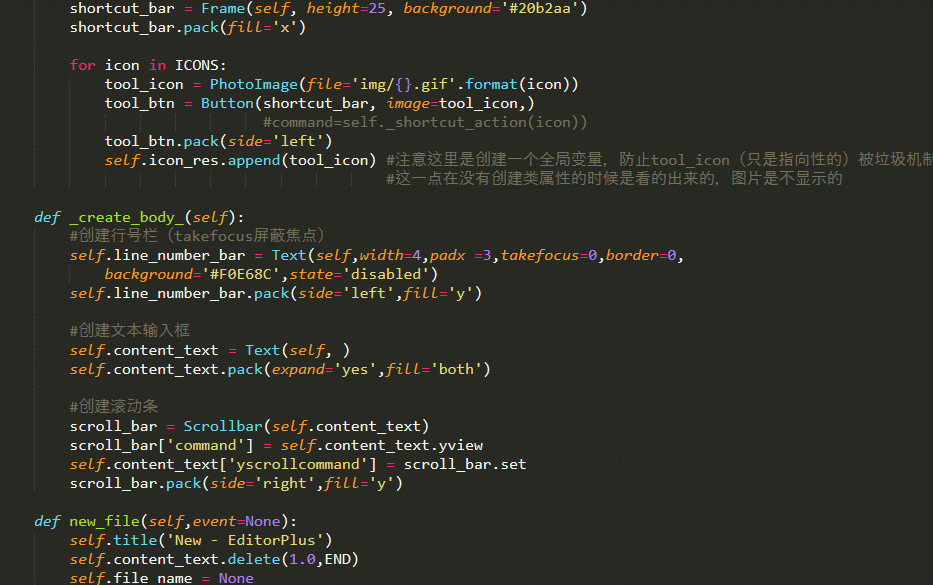LeetCode - Easy - 993. Cousins in Binary Tree
Topic
- Tree
- Breadth-first Search
- Depth-first Search
Description
https://leetcode.com/problems/cousins-in-binary-tree/
In a binary tree, the root node is at depth 0, and children of each depth k node are at depth k+1.
Two nodes of a binary tree are cousins if they have the same depth, but have different parents.
We are given the root of a binary tree with unique values, and the values x and y of two different nodes in the tree.
Return true if and only if the nodes corresponding to the values x and y are cousins.
Example 1:

Input: root = [1,2,3,4], x = 4, y = 3Output: false
Example 2:

Input: root = [1,2,3,null,4,null,5], x = 5, y = 4Output: true
Example 3:

Input: root = [1,2,3,null,4], x = 2, y = 3Output: false
Constraints:
- The number of nodes in the tree will be between
2and100. - Each node has a unique integer value from
1to100.
Analysis
方法一:BFS
方法二:DFS
Submission
import java.util.ArrayList;import java.util.LinkedList;import java.util.List;import com.lun.util.BinaryTree.TreeNode;public class CousinsInBinaryTree {//方法一:BFSpublic boolean isCousins(TreeNode root, int x, int y) {LinkedList<TreeNode> queue = new LinkedList<>();List<Integer> tempList = new ArrayList<>();queue.offer(root);int depth = 0;checkNode(null, root, x, y, depth, tempList);while(!queue.isEmpty()) {depth++;for(int size = queue.size(); size > 0; size--) {TreeNode node = queue.poll();if(node.left != null) {if(checkNode(node, node.left, x, y, depth, tempList))return true;queue.offer(node.left);}if(node.right != null) {if(checkNode(node, node.right, x, y, depth, tempList))return true;queue.offer(node.right);}}}return false;}private boolean checkNode(TreeNode parent, TreeNode child, int x, int y, int depth, List<Integer> list) {if(child.val == x || child.val == y) {list.add(parent == null? -1 : parent.val);list.add(depth);}if(list.size() == 4) {//different parent and same depthif(list.get(0) != list.get(2) && list.get(1) == list.get(3))return true;}return false;}//方法二:DFSpublic boolean isCousins2(TreeNode root, int x, int y) {return dfs(null, root, x, y, 0, new ArrayList<>());}private boolean dfs(TreeNode parent, TreeNode child, int x, int y, int depth, List<Integer> list) {if(child == null) return false;if(child.val == x || child.val == y) {list.add(parent == null ? -1 : parent.val);list.add(depth);}if(list.size() == 4) {//if different parent and same depth is true, return trueif(list.get(0) != list.get(2) && list.get(1) == list.get(3))return true;}return dfs(child, child.left, x, y, depth + 1, list) || //dfs(child, child.right, x, y, depth + 1, list);}}
Test
import static org.junit.Assert.*;import org.junit.Test;import com.lun.util.BinaryTree;public class CousinsInBinaryTreeTest {@Testpublic void test() {CousinsInBinaryTree obj = new CousinsInBinaryTree();assertFalse(obj.isCousins(BinaryTree.integers2BinaryTree(1, 2, 3, 4), 4, 3));assertTrue(obj.isCousins(BinaryTree.integers2BinaryTree(1, 2, 3, null, 4, null, 5), 5, 4));assertFalse(obj.isCousins(BinaryTree.integers2BinaryTree(1, 2, 3, null, 4), 2, 3));}@Testpublic void test2() {CousinsInBinaryTree obj = new CousinsInBinaryTree();assertFalse(obj.isCousins(BinaryTree.integers2BinaryTree(1, 2, 3, 4), 4, 3));assertTrue(obj.isCousins(BinaryTree.integers2BinaryTree(1, 2, 3, null, 4, null, 5), 5, 4));assertFalse(obj.isCousins(BinaryTree.integers2BinaryTree(1, 2, 3, null, 4), 2, 3));}}



































还没有评论,来说两句吧...